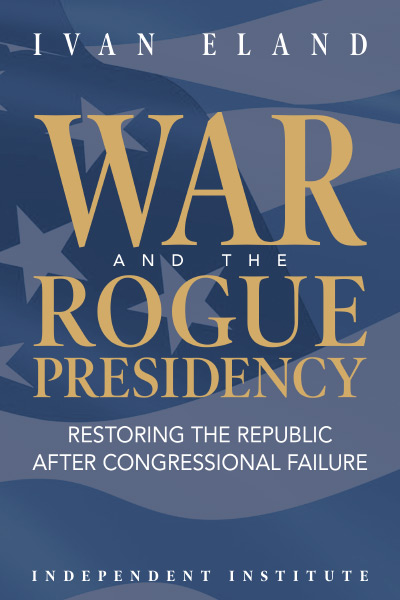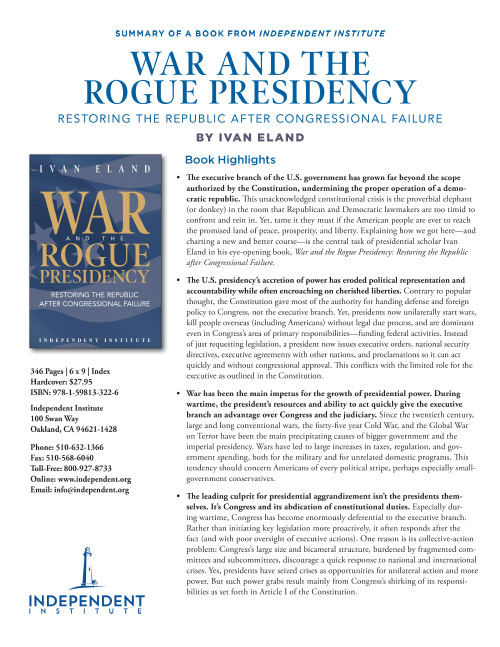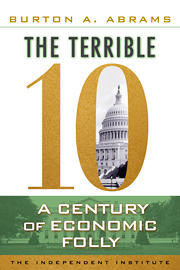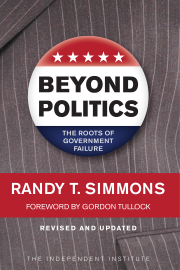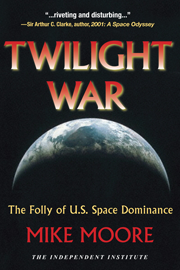| List Price: | ||
| Price: | $19.95 | |
| Discount: | $8.00 (Save 29%) |
| Formats |
Hardcover |
eBook |
| List Price: | ||
| Price: | $19.95 | |
| Discount: | $8.00 (Save 29%) |
| Formats |
Hardcover |
eBook |
Overview
In War and the Rogue Presidency, Ivan Eland shows that almost immediately after the nation’s founding, starting with the first presidency of George Washington, the executive’s role in defense and foreign policy began expanding past what the framers of the Constitution had envisioned. The Constitution enshrined Congress as the dominant branch of government, giving Congress, not the President, most of the powers in defense and foreign policy. This comprehensive book shows how the presidential aggrandizement of greater powers has only been possible because of congressional abdication. However, this expansion of the executive’s role was still relatively contained until the Cold War when undeclared, permanent war became ongoing policy, and then the post-9/11 war on terror dramatically expanded the President’s role. Such expansion has had deleterious effects on U.S. foreign policy abroad, as well as a major erosion of the republic, its security at home, and the liberties of American citizens.
War and the Rogue Presidency is an in-depth examination of the history of the congressional-executive tug-of-war over U.S. security policy and why reclaiming constitutional standards is essential to restore both an effective national defense and civil and economic liberties. To get Congress to do that, Dr. Eland presents ways in which internal congressional incentives could be changed to provide motivation for legislative pushback. As a result, the book suggests important actions Congress could take for such a pushback along with other reforms that would effectively rein in the rogue presidency.
Contents
Introduction: What Is the Imperial Presidency?
- Constitutional Mandates for Defense and Foreign Policy
- America’s Aggressive Expansion
- The United States as a Global Power
- The Rise of the Imperial Presidency
- War Empowers Executive Expansion
- Reclaiming Congressional Authority
Conclusion: Restoring the Founders’ Vision of the Republic
Selected Bibliography
Index
About the Author
Detailed Summary
- The executive branch of the U.S. government has grown far beyond the scope authorized by the Constitution, undermining the proper operation of a democratic republic. This unacknowledged constitutional crisis is the proverbial elephant (or donkey) in the room that Republican and Democratic lawmakers are too timid to confront and rein in. Yet, tame it they must if the American people are ever to reach the promised land of peace, prosperity, and liberty. Explaining how we got here—and charting a new and better course—is the central task of presidential scholar Ivan Eland in his eye-opening book, War and the Rogue Presidency: Restoring the Republic after Congressional Failure.
- The U.S. presidency’s accretion of power has eroded political representation and accountability while often encroaching on cherished liberties. Contrary to popular thought, the Constitution gave most of the authority for handing defense and foreign policy to Congress, not the executive branch. Yet, presidents now unilaterally start wars, kill people overseas (including Americans) without legal due process, and are dominant even in Congress’s area of primary responsibilities—funding federal activities. Instead of just requesting legislation, a president now issues executive orders, national security directives, executive agreements with other nations, and proclamations so it can act quickly and without congressional approval. This conflicts with the limited role for the executive as outlined in the Constitution.
- War has been the main impetus for the growth of presidential power. During wartime, the president’s resources and ability to act quickly give the executive branch an advantage over Congress and the judiciary. Since the twentieth century, large and long conventional wars, the forty-five year Cold War, and the Global War on Terror have been the main precipitating causes of bigger government and the imperial presidency. Wars have led to large increases in taxes, regulation, and government spending, both for the military and for unrelated domestic programs. This tendency should concern Americans of every political stripe, perhaps especially small-government conservatives.
- The leading culprit for presidential aggrandizement isn’t the presidents themselves. It’s Congress and its abdication of constitutional duties. Especially during wartime, Congress has become enormously deferential to the executive branch. Rather than initiating key legislation more proactively, it often responds after the fact (and with poor oversight of executive actions). One reason is its collective-action problem: Congress’s large size and bicameral structure, burdened by fragmented committees and subcommittees, discourage a quick response to national and international crises. Yes, presidents have seized crises as opportunities for unilateral action and more power. But such power grabs result mainly from Congress’s shirking of its responsibilities as set forth in Article I of the Constitution.
- At a time when partisan acrimony has reached new heights, War and the Rogue Presidency offers value for readers across the political divide. Conservatives who lament the erosion of republican and federalist traditions will learn how America’s response to military conflicts has centralized and aggrandized federal power. Progressives worried about social disparities will see how the untying of the executive branch from its constitutional moorings has undermined political responsiveness, favoring the elite classes at the expense of disenfranchised groups. Libertarians who champion private-property rights and civil liberties will better understand why new thinking about the structure of government is crucial for the flourishing of a free society. Most of all, readers will come away understanding how the presidency lost its constitutional bearings—and how Congress can become the proper check on executive power as the framers of the Constitution intended.
The Office of the President of the United States of America isn’t what it used to be—it’s morphed into an overgrown beast. Originally envisioned as a branch of government that would mostly just carry out the will of Congress, it is now in many ways the dominant player, presiding over a bureaucracy with vastly more resources and powers than were authorized by the Constitution. Ironically, the main cause of this transformation is Congress itself.
In War and the Rogue Presidency: Restoring the Republic after Congressional Failure, presidential scholar Ivan Eland (Eleven Presidents, Recarving Rushmore, The Empire Has No Clothes) traces the trajectories of the executive branch and Congress, from the Constitutional Convention to the Obama and Trump years, cataloguing the de facto transfer of power from “the people’s branch” to an increasingly emboldened “rogue” presidency. The result is a landmark study that answers the lingering mystery of U.S. history: How, in a nation whose founders championed a limited government constrained by checks and balances, did the presidency acquire powers not enumerated in the Constitution?
Congress’s perennial in-fighting often inhibits passage of promising legislation and effective oversight of the executive branch. Moreover, Eland shows, the legislature is especially prone to shirking its constitutional responsibilities during wartime, when Congress is all too willing to let presidents set the agenda, often even on domestic issues and at the expense of constitutional protocol. As a result of this inaction and cowardice, wars have become major inflection points in the growth of executive power at home and abroad, enabling presidents to reach into realms once viewed as constitutionally off-limits. The consequence for the American people has been a growing sense of frustration with a federal bureaucracy less responsive to their needs, rather than confidence in a responsive government closely directed by their elected representatives.
More than a history of executive branch transformation, War and the Rogue Presidency points out precisely how Congress has failed the people—thus enabling future lawmakers to avoid similar pitfalls. Offering numerous recommendations to put Congress back in the driver’s seat of the federal government, Eland’s analysis is an important contribution toward fulfilling the Founders’ mission of creating “a more perfect union.”
Imperial Presidency, Rogue Presidency
To explain the rogue presidency—and its causes, consequences, and cures—Eland notes that we must first understand its profound reach. Today, the executive branch of the U.S. government is a sprawling bureaucracy that accounts for 99 percent of federal employees and spends the equivalent of about 17 percent of the country’s gross domestic product. More importantly, it commands far more power than the Constitution’s framers enumerated in the nation’s federal charter. But when and how did the executive branch’s transformation begin?
Although the growth spurt in the executive branch accelerated during the twentieth century, U.S. foreign policy from its onset was plagued with “creeping despotism.” Beginning with George Washington, presidents have acted as if they possessed the extra-constitutional “inherent power” championed by Alexander Hamilton. Washington’s Neutrality Proclamation, for example, usurped Congress’s constitutional prerogative on the question of whether the United States would get involved in England’s war with France. Similarly, Thomas Jefferson’s Barbary War, James Polk’s provocation of war with Mexico, and Franklin Pierce’s coerced opening of trade with Japan also usurped Congress’s responsibility for setting defense and foreign policy. New assertions of presidential power, however, were often met with congressional pushback, including immediately after the two world wars.
Not until Truman and the Korean War did the presidents take their country into massive wars without congressional approval. Modern presidents also claim “executive privilege” to initiate covert operations unsanctioned by Congress, top-level agreements with foreign nations, and executive orders with no enabling legislation. This status quo is taken for granted. Most popular coverage of the Oval Office accepts the broad powers of the presidency as “the natural order of things,” even though they run counter to the president’s authority as spelled out in Article II, Sections 2 & 3 of the Constitution.
War Is the Health of the State
Muckraking journalist Randolph Bourne famously quipped a century ago that “war is the health of the state”—meaning that governments gain tremendous power at the expense of civil society during wartime. War causes government to grow even at home, and war is especially a tonic for the growth of the executive branch.
Eland traces the history of federal domestic programs launched during wartime. The list is staggering, beginning with taxes. The income tax, progressive taxation, double taxation, tax withholding, tax expenditures (a.k.a. tax loopholes), the estate tax, gas taxes, and the IRS all have their origins in wartime. Social programs originating during wartime include relief for the poor and public works, Social Security, expansion of Medicaid to cover preventive care for children, public housing and rent control, federal involvement in daycare, grants-in-aid to states, and even federal involvement in regulating marriage.
Federal domestic efforts begun during wartime to address the economy more broadly include measures to combat unemployment, price controls, healthcare market interventions, nationalization of industries, involvement in labor relations, inflationary money printing, financial bailouts, regulation of food and alcohol, “wars” on prostitution, and even daylight saving time.
Reclaiming Congressional Authority
The expansion of executive power—especially since the dawn of the Cold War—is due less to presidential power grabs than to Congress’s dereliction of duties. The presidency isn’t inherently imperial, it’s contingently imperial. How might Congress regain its role as spelled out in the Constitution? Eland offers numerous recommendations.
Congress as currently structured has numerous flaws that create perverse incentives or otherwise impede its ability to act. Some of these flaws could be fixed by Congress itself. The committee structure, for example, decentralizes power to such a degree that important bills can wither on the vine. Centralizing congressional power, eliminating the seniority system, ending the “horse trading” that accompanies the congressional budget process, and making it harder for legislators to add special-interest riders to legislation—all would give congressional leaders greater control of their chambers, better enabling Congress to counter the aggrandizement of executive power. Congress should also more aggressively seek information held by the executive branch.
Congress, Eland argues, should repeal the confusing War Powers Resolution and strictly enforce the Constitution and the Authorization for Use of Military Force that presidents have abused in their prosecution of the War on Terror, including by conducting warrantless spying on Americans. More broadly, Congress should establish a statutory charter for the intelligence community, outlaw the covert destabilization of other governments during peacetime, and require that funding for intelligence agencies be made public. Eland offers several additional recommendations for Congress, as well as changes for the federal judiciary and structural changes in the executive branch itself.
With these and related changes, Congress could better deter presidential usurpations and abuses of power. And with congressional power properly restored, citizens could hope for a legislature more responsive to their needs.
“James Madison’s system of checks and balances, enshrined in the Constitution, can be revitalized if the aforementioned measures are taken to restore Congress’s standing and if the federal courts abandon their fear of pushback on executive aggrandizement in the national security and foreign policy arenas,” Eland writes.
Praise
“Since World War II and then with the post-9/11 ‘War on Terror,’ the enormous expansion of presidential powers to wage permanent wars around the world has had ruinous effects on U.S. foreign policy and the liberties and security of both Americans and people worldwide. Ivan Eland’s superb book War and the Rogue Presidency could not be more timely in examining in depth the history of the congressional-executive tug-of-war over U.S. security policy, how the imperial presidency has created and perpetuated major defense and foreign policy failures, why reclaiming congressional oversight is essential, and what specific measures can and should be adopted to restore an effective national defense and constitutional liberties. I highly recommend War and the Rogue Presidency for anyone.”
—Daniel Ellsberg, author, Secrets: A Memoir of Vietnam and the Pentagon Papers and The Doomsday Machine: Confessions of a Nuclear War Planner
“War and the Rogue Presidency is a fascinating history of the relationship between wars and the rise of the imperial presidency. If war is the mother of Big Government, it is also mother to presidents who used their expanded powers in ways exceeding the limits envisioned by America’s Founders. The solution, Eland argues, is for Congress to restore its authority and restrain the ‘creeping despotism’ that has led to unbridled presidential power. Eland provides concrete steps Congress may—and should—take to keep presidents from going ‘rogue.’ Highly recommended!”
—Jonathan J. Bean, Professor of History, Southern Illinois University
“In War and the Rogue Presidency Ivan Eland chronicles the rise of the imperial presidency with great insight. But does he have a solution? It’s worth pondering.”
—Mike M. Moore, former Editor, Bulletin of the Atomic Scientists; author, Twilight War: The Folly of U.S. Space Dominance
“In the well-written and thought-provoking book, War and the Rogue Presidency, Ivan Eland convincingly demonstrates that the expanding power of the executive branch, which has resulted in the creation of the imperial presidency, is a result of our increasing involvement in foreign wars. A must read for those concerned about the decline of the checks and balances envisioned by our Founding Fathers.”
—Lawrence J. Korb, former Assistant Secretary, U.S. Department of Defense; Senior Fellow, Center for American Progress; former Senior Fellow and Director of National Security Studies, Council on Foreign Relations
“Ivan Eland’s learned and balanced book, War and the Rogue Presidency, identifies war as one of the chief threats to the Republic, whether we win or lose, given the effect of war on presidential power. Few subjects are worthy of greater public debate.”
—Richard Shenkman, Founder, History News Network, George Washington University
“The seemingly permanent mobilization of American society since the Second World War to manage global security has produced a bloated, intrusive, and increasingly imperial and unresponsive federal government. In his book War and the Rogue Presidency, Ivan Eland sees clearly the danger to our freedom and outlines the Congressional and other reforms needed to find the path back.”
—Harvey M. Sapolsky, Professor of Public Policy and Organization Emeritus and former Director of the Security Studies Program, Massachusetts Institute of Technology
“After seventy years of a monolithic, interventionist foreign policy that has ruled Washington elites, the superb book War and the Rogue Presidency is calling for an essential, realist American foreign policy emphasizing a robust diplomacy, military restraint, and increased congressional oversight. Author Ivan Eland has assembled an outstanding and lucid, critical examination of how the Executive must be reined in from being granted unprecedented powers to wage perpetual war globally that is subverting the Constitution, costing trillions, harming millions, trampling on civil liberties, and creating more and more enemies who endanger America. War and the Rogue Presidency is must reading for anyone seeking a safer, freer, and more peaceful world.”
—Rand H. Paul, M.D., U.S. Senator and Member of the U.S. Senate Committee on Foreign Relations and Committee on Homeland Security and Government Affairs
“War and the Rogue Presidency is an invaluable history of the constitutional basis for Congress’s war-making power that has been all but forgotten and ignored in the last two decades; and as a bonus the book also makes a compelling case linking unapproved administrative-state operations abroad with the development of the administrative state domestically—both products of congressional abdication.”
—C. Boyden Gray, former U.S. Ambassador to the European Union; former Counsel to President George H. W. Bush; former Special Envoy for European Affairs and Special Envoy for Eurasian Energy at the Mission of the U.S. to the European Union; former Counsel to the Presidential Task Force on Regulatory Relief; former Chairman of Administrative Law and Regulatory Practice of the American Bar Association
“Today’s domineering president and dysfunctional Congress worry Americans on the right and the left about the serious problem of the imperial—or rogue—presidency. Ivan Eland’s book War and the Rogue Presidency explains the problem’s history, highlights the combination of wars and congressional abdication that brought us to our current state, and offers an agenda to restore the Constitution’s just checks and balances. There is a lot to learn from this important book.”
—Eugene Gholz, Associate Professor of Political Science, University of Notre Dame; former Senior Advisor to the Deputy Assistant Secretary of Defense for Manufacturing and Industrial Base Policy, U.S. Department of Defense; author, Buying Military Transformation: Technological Innovation and the Defense Industry and U.S. Defense Politics: The Origins of Security Policy
“I have enjoyed reading Ivan Eland’s book, War and the Rogue Presidency. Given the mounting concern in our body politic about the extent to which the Congress has yielded its constitutional authority to a president prone to ignore the Constitution and take the expedient course without consultation with the people’s representatives, it is very timely. It documents the sad series of executive usurpations of legislative authority that have transformed the American republic into a warfare state headed by an elected despot. It concludes with numerous recommendations for remedial action to restore the legislative power and the civil liberties our founding fathers considered essential to preserving our liberties. War and the Rogue Presidency is must reading for anyone concerned about presidential overreach and the demise of the checks and balances of our constitutionally mandated separation of powers.”
—Charles W. Freeman, Jr., former U.S. Ambassador to Saudi Arabia; former Assistant Secretary of Defense for International Security Affairs; Chairman, Projects International, Inc.
“Once more in War and the Rogue Presidency, Ivan Eland has given us a book that challenges orthodoxies on the left and right. A century ago, in the midst of World War I, Randolph Bourne warned that ‘war is the health of the state.’ Subsequent experience has made it necessary to sharpen that point: war is the health of the presidency. Eland attributes the enormous power the executive wields at home and abroad not to some purportedly inevitable forces of modernization but to executive calculation and Congressional abdication. He calls for Congress to reassert its Constitutional war powers and recalibrate the balance of power in DC. His proposals will provoke both liberals and conservatives. Few readers will be left indifferent to Eland's call to abolish the Electoral College.”
—Richard M. Gamble, Anna Margaret Ross Alexander Chair in History and Politics, Hillsdale College; author, The War for Righteousness: Progressive Christianity, the Great War, and the Rise of the Messianic Nation
“Ivan Eland is one of America’s top experts on U.S. presidents and their conduct of foreign policy. War and the Rogue Presidency is his finest book so far, and it provides a searing indictment of rapidly growing presidential abuses. Eland shows how an out-of-control imperial presidency is not only destroying America’s reputation abroad, it is undermining our entire constitutional system of government and inflicting fatal wounds on the domestic liberties Americans cherish. War and the Rogue Presidency is essential reading for anyone who wants to help reverse that ominous trend.”
—Ted Galen Carpenter, Senior Fellow for Defense and Foreign Policy Studies, Cato Institute
“Few readers, even those who start from very different political principles, will fail to be impressed with Ivan Eland’s passionate, provocative and historically informed case against the ‘Rogue Presidency’ and his call for returning the power to declare war to the Congress. War and the Rogue Presidency is a timely and important book.”
—Hugh T. Rockoff, Distinguished Professor of Economics, Rutgers University
“In this fine book, Eland interweaves constitutional theory and micro-history to produce a thoughtful and insightful analysis of the war-making powers of the American President. He is relentless in his critique of both Presidents who have transgressed and Congresses which have allowed transgressions. War and the Rogue Presidency both extends and focuses Eland’s earlier work on the fabric of power in the United States.”
—T. Hunt Tooley, Professor of History, Austin College; author, The Western Front: Battleground and Homefront in the First World War
“In the past half century, Americans suffered serious threats to their civil liberties and Constitutional rights during the Vietnam War (Richard Nixon and Watergate), the war in Central America (Ronald Reagan and Iran-Contra), and the post-9/11 ‘war on terror.’ Ivan Eland’s important book War and the Rogue Presidency not only traces the connection between war and growth of the ‘imperial presidency’ from the earliest days of our republic, but shows that our current national policy of seemingly permanent conflict abroad puts our rights at home very much at risk today. Just as important, he offers practical suggestions for ways that Congress might reassert its Constitutional powers in foreign policy to rein in an overweening executive branch.”
—Jonathan V. Marshall, author, The Lebanese Connection: Corruption, Civil War, and the International Drug Traffic and The Iran-Contra Connection: Secret Teams and Covert Operations in the Reagan Era
“Ivan Eland’s book War and the Rogue Presidency substantiates five important facts. First, wars have allowed U.S. presidents to break free of the constitutional chains that limit executive power. Second, presidents are power seeking and thus incentivized to engage in war to enhance their domestic policy prerogatives. Third, the original constitutional republic is incompatible with and being increasingly undermined by rogue, a.k.a. imperial, presidents. And, fourth, now that the chains of the Constitution have been replaced with ropes of sand, a plebiscitary despotism is emerging with the president at its head. However, Eland doesn’t leave his readers hopeless. His proposals for remedying the problem of the rogue presidency may or may not succeed, for a variety of reasons. Nevertheless, in a worse-case scenario it is not unimaginable for a president to go rogue and declare war on his own domestic enemies. Today presidential powers are so vast that some future president may decide to establish the circumstances (i.e., create the crisis), and then proceed to remedy it (i.e., war). This isn’t the soft despotism of bureaucratic usurpation of property rights for which we’ve become accustomed, but despotism with bullets flying. If this seems to be ridiculous, read War and the Rogue Presidency and then judge for yourself.”
—Marshall L. DeRosa, Professor of Political Science, Florida Atlantic University
“For America’s elites, no cash cow is more sacred than the military-industrial complex. Six decades after President Dwight Eisenhower warned against it, Ivan Eland shows how the refusal of Congress to meet constitutional responsibilities has led to a warfare state—with consolidation of undemocratic power in the White House. War and the Rogue Presidency offers a methodical indictment of congressional complicity that has ushered in perpetual war. This book challenges readers across political spectrums to face the dire realities of red-white-and-blue militarism run amuck. While spelling out how powerful forces have turned Congress into an accessory to normalize ongoing warfare, the author also provides clear ideas for how the legislative branch could end its capitulation to a brutal war machine.”
—Norman Solomon, Founder and Executive Director, Institute for Public Accuracy; author, War Made Easy: How Presidents and Pundits Keep Spinning Us to Death
“Ivan Eland's important book War and the Rogue Presidency exposes the dangerous and often quasi-dictatorial power that U.S. presidents have amassed since the 20th century and how that power has resulted in a long and seemingly endless series of disastrous wars. Thankfully, Eland also provides a list of practical, concrete ways Congress and U.S. citizens can reclaim power from the executive and create something far closer to true democratic governance in this country.”
—David Vine, Professor of Anthropology, American University; author, Base Nation: How U.S. Military Bases Abroad Harm America and the World
“Thoroughly researched and informative, the valuable book War and the Rogue Presidency traces the history and evolution of excessive Presidential authority, explains how this accretion of executive power is contrary to the Constitution and the vision of the founders, and argues for urgent measures to restore congressional authority and limit the ability of Presidents to drag the nation into unnecessary and unwinnable wars.”
—David Cortright, Director of Policy Studies, Kroc Institute for International Peace Studies, University of Notre Dame; Chair of the Board, Fourth Freedom Forum
“A timely and extraordinary contribution to the current on-going national discussion over separation of powers with respect to our Federal government, War and the Rogue Presidency: Restoring the Republic after Congressional Failure is a critically important and unreservedly recommended addition to both community and academic library Contemporary Political Science collections—as well as a ‘must read’ study for political activists and non-specialist general readers with an interest in the subject.”
—Midwest Book Review
“In his latest book, War and the Rogue Presidency, author Ivan Eland calls out Congress for surrendering its war-making power to the president. . . . While Eland expertly identifies several reasons for the legislative branch’s export of its power of making war to the executive branch, he points to partisanship as perhaps the most relevant reason for that relinquishment. . . . No one who’s taken even peripheral notice of the behavior of lawmakers—federal and state—and their inclination to put faith to party above faith to principle could disagree with Eland. Eland’s expert examination of the manifold ways political parties and their leadership structure contribute to congressional willingness to rubber-stamp executive combat operations reminds readers of John Trenchard’s savage discourse on the real purpose for a politician’s fidelity to his political party. . . . In War and the Rogue Presidency, Eland examines why a president would want to possess a power considered by most lawmakers to be politically fatal to their congressional careers. . . . Unlike most contemporary critics of the never-ending wars, most of which are begun by the president, Ivan Eland not only diagnoses the disease, but he suggests a course of treatment that could, if followed faithfully, cure it. . . . And that is a call to action we can eagerly endorse.”
—The New American
Awards
2020 American Book Fest “Best Book” Awards
- Finalist in History (United States)
- Finalist in Best Cover Design (Non-Fiction)
2020 International Book Awards
- Finalist in History (United States)
- Finalist in Best Cover Design (Non-Fiction)
2020 Next Generation Indie Book Awards
- Finalist in Current Events/Social Change
2020 Independent Publisher Book Awards (“IPPY” Awards)
- Gold Medal Winner in Current Events/Political/Economic/Foreign Affairs
14th Annual National Indie Excellence Awards
- Finalist in History (United States)
News
Events
| Event | Date | |
| Sr. Fellow Ivan Eland, author of War and the Rogue Presidency to speak at Freedom Hub Webinar on January 15, 2020. | Wed., Jan. 15, 2020 | |
| Senior Fellow Ivan Eland speaks about his Independent Institute book, War and the Rogue Presidency, at “Domestic Coalition Meeting,” hosted by Americans for Tax Reform, Washington, DC | Wed., Nov. 20, 2019 | |
| Sr. Fellow Ivan Eland, author of War and the Rogue Presidency, is participant at DOD Think Tank Executive Roundtable, U.S. Capitol Building, Washington, D.C. | Fri., Nov. 1, 2019 | |
| Sr. Fellow Ivan Eland, author of War and the Rogue Presidency speaks at John Henry’s Empire Salon on September 17, 2019 | Tue., Sep. 17, 2019 | |
| Sr. Fellow Ivan Eland, author of War and the Rogue Presidency speaks at the Committee for a Responsible Foreign Policy in Washington, DC, on September 10, 2019 | Tue., Sep. 10, 2019 |

